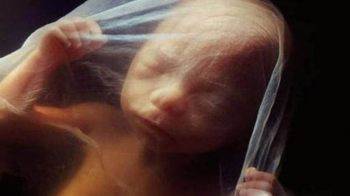When approaching a discussion on abortion, even in so-called conservative Christian circles, at least traditionally, you will often hear people arguing that abortion shouldn’t become a single-voter issue. In other words, these people like to trick themselves into thinking that who we vote for, based on their policies, is bigger than the doctrine and  practice of abortion. These people like to lull themselves into the idea that they are more nuanced, that they have greater sophistication, that they understand the complexity of life better than those who would argue that, indeed, abortion, all by itself is worthy of reducing a political vote to that issue alone.
practice of abortion. These people like to lull themselves into the idea that they are more nuanced, that they have greater sophistication, that they understand the complexity of life better than those who would argue that, indeed, abortion, all by itself is worthy of reducing a political vote to that issue alone.
Catholic author, and theologian, Andrew Willard Jones in his book Two Cities: A History of Christian Politics points out just how insidious and pervasive the logic of abortion actually is. He points up how antiChrist, and how present this logic has been since the beginning, in every culture and society since the fall of humanity. His treatment puts the idea of abortion being just one issue among other considerations, when it comes to political appointments, so on and so forth, on ice. He writes:
Abortion is not, therefore, one issue among other issues. It is the most fundamental postmodern issue. As we saw earlier in this book, the gods of the ancient world demanded that their servants sacrifice their children to their power. This was the “abomination” that the Lord refused to Israel in the Old Testament and to which Israel was continuously tempted. In the Bible, this is not a random picture of evil meant merely to shock us. It is, rather, based on an anthropological insight: the willingness to kill your child and the consequent construction of a system of child murder is the only path to pure power, pure sovereignty. Pure power demands that keeping helpless people alive be a voluntary display of power, a whim of the strong; otherwise, if power is ever revealed to be for the weak, the social hierarchy is inverted, and the whole system is exposed for the lie that it is. This is why, as we saw earlier in this book, nearly all pagan societies condone the killing of babies. This is how human power can speak order into chaos without opening itself to what is beyond it, to the transcendent. Nowhere, the, is the West’s final slide into post-Christian paganism clearer than in the abortion regime, which kills around sixty million children every year, roughly 20 percent of all babies. As the pope wrote: “Where God is denied and people live as though he did not exist, or his commandments are not taken into account, the dignity of the human person and the inviolability of human life also end up being rejected or compromised.”[1]
Abortion is the ultimate stand of the pagan kingdom, the kingdom of darkness. As Jones rightly develops, believing that it is you, and you alone who holds the power of life and death, the life and death of the most vulnerable in your hands, provides someone with a sense of power that in fact God alone possesses. To contradict this power, as the Gospel does, is to contradict the very being, the very esse of the homo incurvatus in se (human incurved upon itself). This is where the den of darkness and demons have pitched their tents, and is why when challenged it would seem as if the hornets’ nest of kingdom done has been poked.
At least for the Christian, the Christian whose life is conditioned by the reality of the Gospel, abortion is the single issue of all time that will motivate them, like nothing else, to fight with all the spiritual weaponry at their disposal. Abortion is antiChrist precisely because it represents the exact opposite of the Kingdom of the Son of His love which is defined by the least of these; by the most vulnerable among us; by the children, particularly children yet in their mother’s wombs. And the Christian, as Jones understands, recognizes that there is, indeed, a logic that underwrites the impietas (unholy doctrine) of abortion. The logic itself funds the culture, or as Isaiah identifies it, the covenant with death, that the profane culture has decidedly made by virtue of their fallen antiChrist natures. The only response to this logic comes from the logic of the Kingdom of Christ, it is a logic that elevates the weak of society, while at the same time putting down the strong; that is, by what counts as such things in the broader society’s purview.
Abortion is not a single-voter issue when it comes to political activity. It is the issue for precisely the reasons that Jones helpfully identifies for us. Made God have mercy on us all if in fact we don’t in some way bear witness to the fact that God is God, and we are not. And may this activism, this proclamationism result in bringing life to the world rather than death; for as Christians we have chosen life, or we are no Christians at all.
[1] Andrew Willard Jones, The Two Cities: A History of Christian Politics (Steubenville, Ohio: Emmaus Road Publishing, 2021), 336-37.
